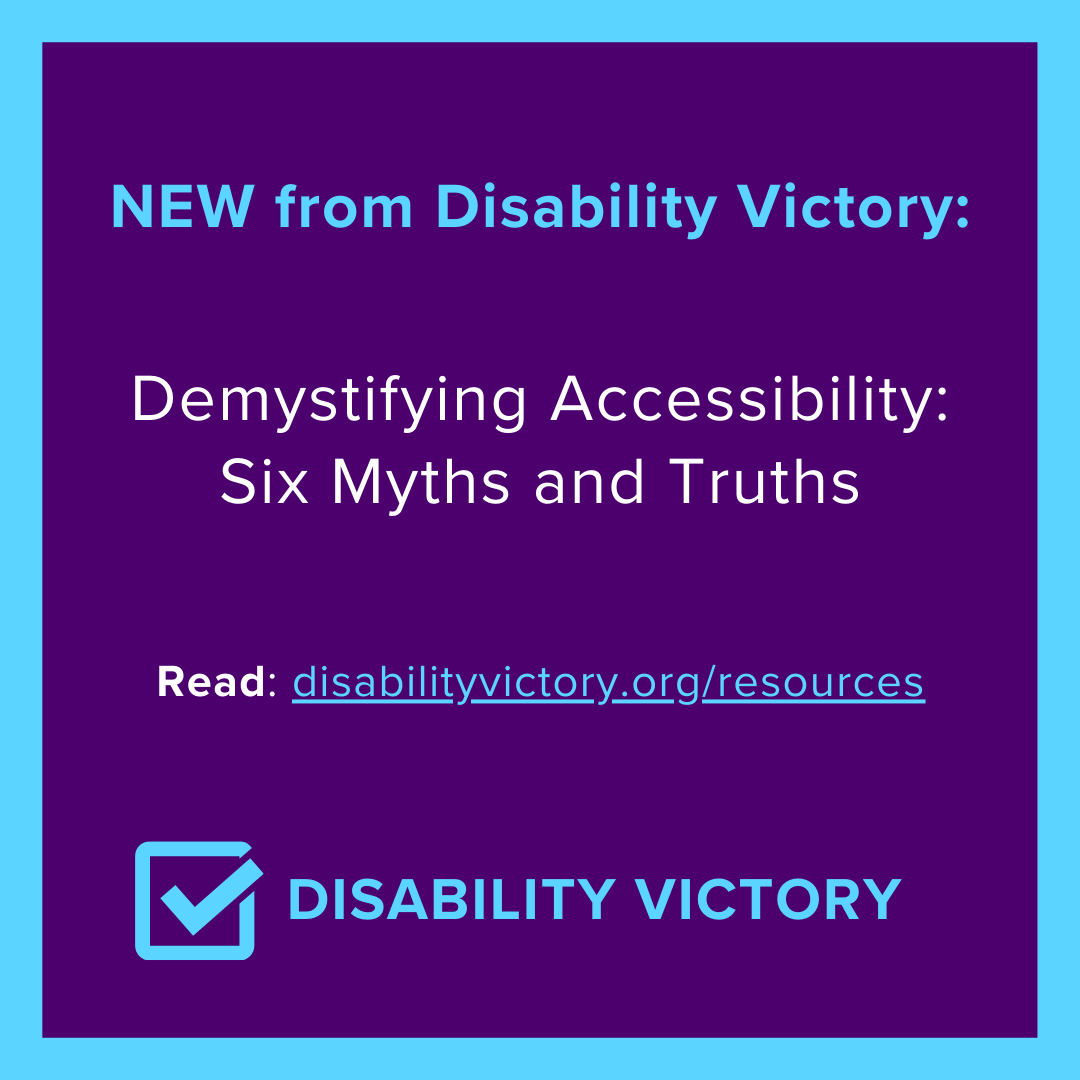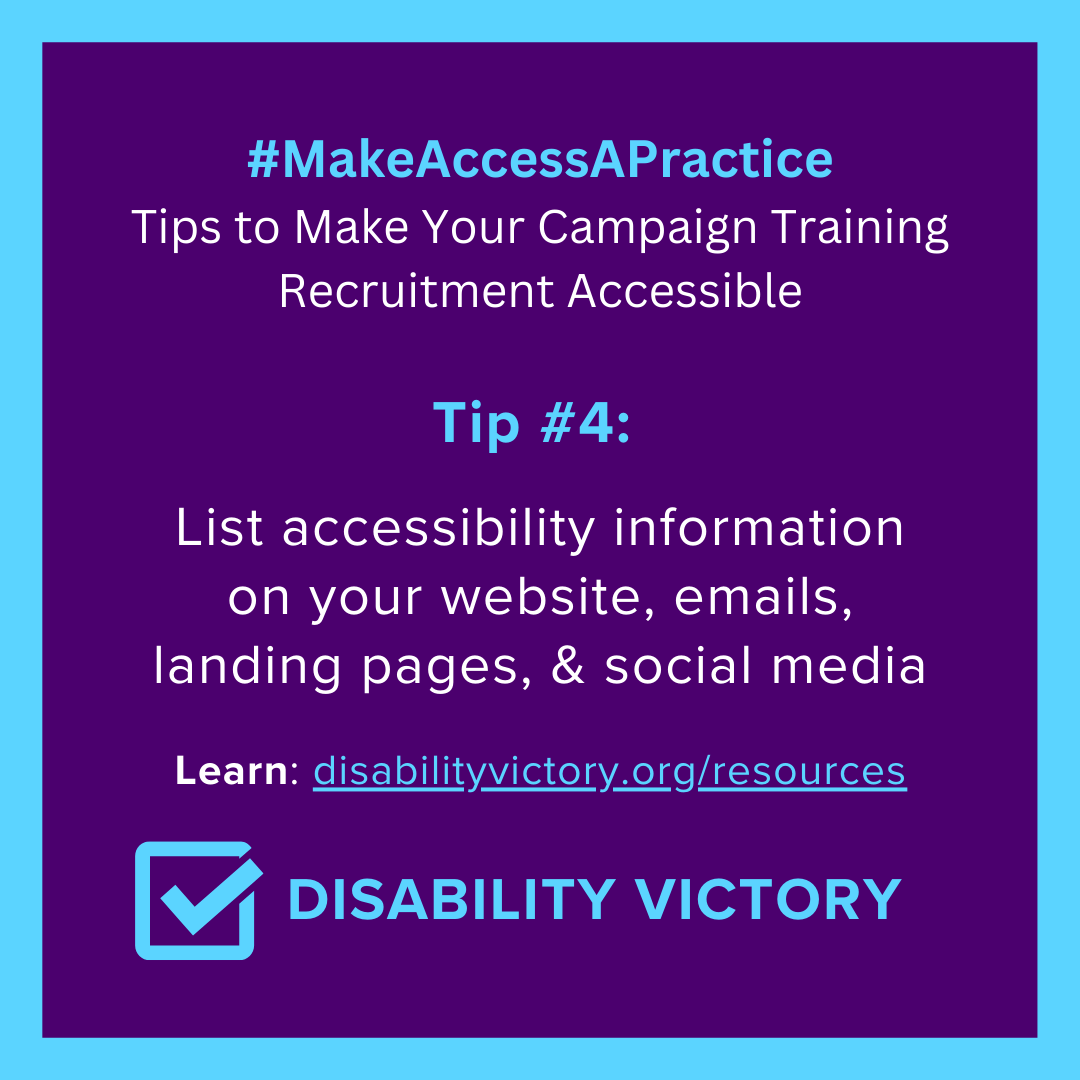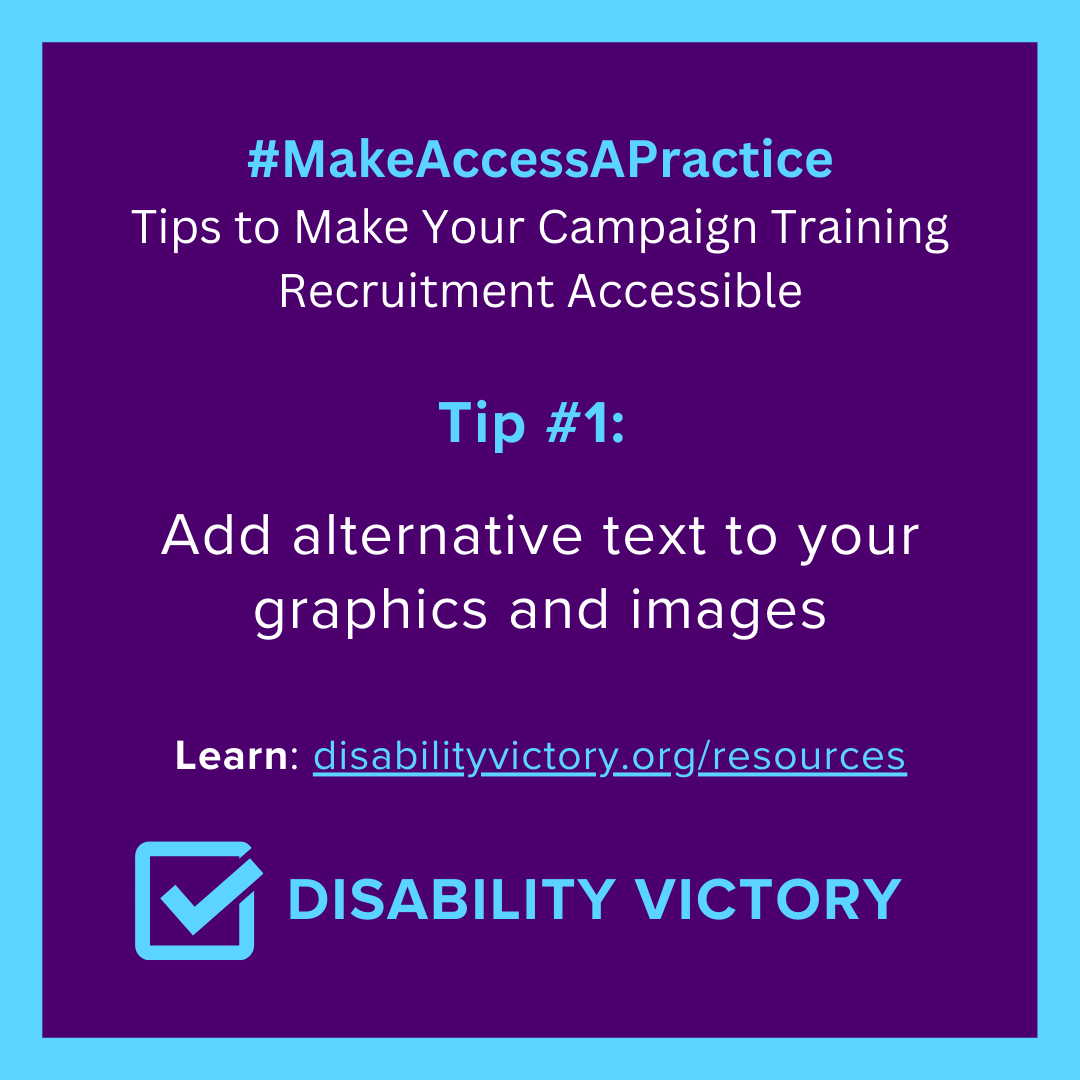Resources
Are you a disabled leader looking for advice on how to enter the political arena? A campaign training organization committed to becoming more accessible and inclusive? You’ve come to the right place.
Resources for Disabled Candidates:
Fighting Back Under a 2nd Trump Administration, Part 1: Electoral Organizing
Self-Care on the Campaign Trail: Disabled Leaders Share Their Wisdom
Canvassing with a Disability: Disabled Political Leaders Share Their Best Practices
Social Security and Running for Office: What You Need to Know
Social Security and Running for Office, Part 2: Legislative and Regulatory Changes
Resources on Accessibility:
Social Media Accessibility for Campaigns: Understanding Barriers and Best Practices
Make Access A Practice:

Fighting Back Under a 2nd Trump Administration, Part 2
In December, we discussed some of the ways that we can fight for our local communities through electoral organizing. However, we know that electoral organizing is just one tool in the fight for our communities, and it’s one that many people may feel wary about, especially right now.
In this piece, we will highlight just a few options for taking action. Read on to learn more about how you can get involved in disability organizing, workplace unionization efforts, protecting our libraries, and clean air advocacy, and learn about your rights if you plan to protest as a disabled person.

Fighting Back Under a 2nd Trump Administration, Part 1: Electoral Organizing
There is no one “correct” way to prepare for what’s ahead, and we will need everybody to contribute to building stronger, welcoming, and accessible communities. Whether that’s running for office or running a mutual aid network, there’s a way for us all to get involved. We need a diversity of tactics and voices.
Over the next few weeks, we will explore options for taking action in the days ahead. Today, we’re focusing on ways to fight back within the electoral system: running for local office, running for state office, and ballot measures.

Social Media Accessibility for Campaigns: Understanding Barriers and Best Practices
Accessibility and disability inclusion are important for every aspect of a campaign, from events to policy platforms. Digital accessibility is a key part of this, as websites, emails, and social media get the candidate’s message out to the world. Digital platforms are important tools for voter persuasion, volunteer recruitment, fundraising and get-out-the-vote (GOTV) efforts. Campaigns must make their digital communications accessible to reach potential voters, volunteers, and supporters in the disability community.

How to Talk to Your Employer about Running for Office
Deciding to run for office is one of the most exciting yet daunting decisions you'll make as a candidate. This decision to run leads to a series of conversations in your personal and professional life. In this piece, board member and former NYC Council Candidate Rebecca Lamorte discusses one of those vital discussions -- telling your employer you'll be running for office and navigating what that means for you professionally and personally.

Demystifying Accessibility: Six Myths and Truths
While many organizations want to improve their accessibility, they’re sometimes intimidated by the prospect. Other organizations may not see accessibility as a priority. Unfortunately, there are many myths floating around about accessibility that lead to misconceptions about what it is and how to implement it. Follow along as we break down each of these myths and what you need to know about accessibility.

Self-Care on the Campaign Trail: Disabled Leaders Share Their Wisdom
How do candidates and campaign staff prioritize taking care of themselves on the campaign trail? We reached out to disabled elected officials and campaign staffers for their experience and advice.

Canvassing with a Disability: Disabled Political Leaders Share their Best Practices
In celebration of National Run for Office Day 2024, we’ve set out to learn from disabled former candidates, elected officials, and campaign staff how they’ve made canvassing accessible to them.

All Politics is Local: Why You Should Run for Local Office
Out of the over 500,000 elected officials in this country, over 493,000 of them are local elected officials. Your role in local government can influence policy that can better your community.

Social Security and Running for Office, Part 2: Legislative and Regulatory Changes
Disabled people on Social Security and Medicaid may have to choose between continuing to receive benefits and running for office. What can be done so that more disabled people can serve in elected office? Read on to learn what legislation has been proposed to fix this issue, and what else can be done to level the playing field when it comes to running for and serving in elected leadership.

Social Security and Running for Office: What You Need to Know
Can you run for office if you receive Supplemental Security Income (SSI) or Social Security Disability (SSDI or DIB) benefits? This is a question that I got frequently during my time on staff at the National Council on Independent Living (NCIL). It’s an important question for disabled people. While not all disabled people receive Social Security, as of the end of 2020, about 12 million people ages 18 to 64 received social security disability benefits.

Make Access A Practice Tip 4: List accessibility information on your website, emails, landing pages, and social media
By providing accessibility information on your websites, event landing pages, emails, and social media, you will give disabled people important information about the accessibility of your program and what accommodations will be provided.

Make Access A Practice Tip #3: Provide a Way to Request Accommodations
Welcome back to #MakeAccessAPractice! Today, we will be discussing program accommodations: what they are, why they’re important, and how to ensure that your program attendees can request them.

Make Access A Practice Tip #2: Caption Your Videos
In this week’s #MakeAccessAPractice, we’ll talk all about the importance of adding accurate captions to your videos and how you can add them on any platform.

Make Access A Practice: Tips to Make Your Campaign Training Recruitment Accessible
Are you one of the many campaign training programs that are equipping future campaign staff, candidates, and organizers with the skills they need to succeed in the political arena? Over the next few weeks, we are going to highlight some of our top tips for making your campaign training recruitment process more accessible.
